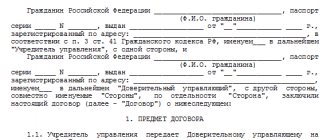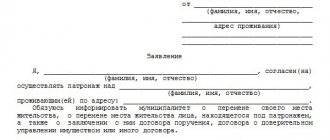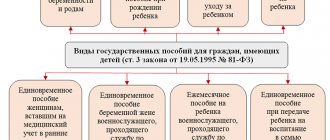It is gradually becoming more difficult for older people to carry out everyday activities (cooking, cleaning, performing hygiene procedures), especially if they have chronic pathologies or mental disorders. Upon receipt of an appropriate application, guardianship authorities have the right to arrange patronage for an elderly person. His close relatives are chosen as assistants. In their absence, other persons are appointed. In some cases, for assistance provided, the state issues pension supplements intended to compensate for the caregiver’s time, and even accrues seniority.
What is patronage?
The word “patronage” is translated from French as “guardianship.” It is necessary for people who have reached the age of majority, but have health problems due to which they cannot fully defend their interests in court or carry out everyday activities. To provide a guardian to the guardianship authorities, a citizen in need of assistance must write a corresponding application. Then an agreement is drawn up, which reflects the essence of patronage. The appointed person is obliged to perform certain work to care for the elderly person and use the funds provided exclusively for the benefit of the ward. Based on the person’s condition, guardianship authorities can provide 2 options for assistance:
- The appointment of a guardian is required for incapacitated citizens. The problem is caused by the presence of serious illnesses, mental disorders, amnesia and other factors that do not provide the opportunity to be fully responsible for one’s actions. An employee appointed by the guardianship authorities will be required to care for the ward around the clock (feed, monitor medication intake and hygiene) and, if necessary, represent his interests in court. The funds received by an incapacitated citizen (pensions, social benefits, alimony) must be wisely spent by his guardian on the purchase of food, clothing and creating comfort in the home. An authorized person has the right to dispose of the movable and immovable property of a ward only after the approval of the guardianship authorities.
- Patronage is one of the types of guardianship. It is installed over elderly people who do not have mental problems, but suffer from physical ailments. Due to various pathologies, their ability to perform daily work and solve financial issues is limited. The person providing patronage is, first of all, an assistant who solves everyday issues. The trustee has no right to manage the property of the ward without the appropriate permission and drawing up an agency agreement.
What is the difference between patronage and guardianship?
Patronage support includes only solving everyday issues aimed at maintaining an acceptable lifestyle and creating favorable living conditions. A person who decides to hire an assistant must be of sound mind and not have psychological illnesses.
An incompetent person, if there is a court decision recognizing incompetence, can only be placed under full guardianship. In this case, not only the responsibilities for supervision are transferred to the guardian, but also the rights to dispose of property and income received.
Legal basis
Guardianship of an elderly person is assigned on the basis of Federal Law No. 48 and Article 41 of the Civil Code of the Russian Federation:
- In 41 Art. The civil code stipulates the following details: The procedure for registering guardianship over a person who has reached 18 years of age.
- Features of drawing up agreements allowing authorized persons to manage the property and funds of the ward.
- Classification of citizens who need help.
- Appointment of guardianship authorities responsible for the actions of the trustee or guardian chosen by them in accordance with the drawn up and signed agreement.
- Reveals the essence of concepts related to the provision of patronage or guardianship.
Conditions for registration of a patronage agreement
Drawing up an agreement is the most important part of the procedure, helping to record all the rights and obligations of the parties. Usually it includes a full description of the actions that the guardian will perform, specifying in detail what, how, and to what extent will be done to ensure a dignified old age for the pensioner.
When registering, it is important to take into account all possible little things and details, then there will be no disagreements when receiving requests from an elderly person, the execution of which is not recorded on paper.
Registration of patronage does not involve transactions with the citizen’s property and management of his finances, however, if the ward wants to entrust these matters to an assistant, a power of attorney is issued to him or an additional agreement is drawn up.
Who is eligible to become a caregiver for an elderly person?
Guardianship authorities select assistants for patronage within 30 days from the date of submission of the application and the documents attached to it. The emphasis is on close relatives, but sometimes a stranger is also selected (depending on the situation). The Family Code of the Russian Federation on guardianship of the elderly states that it is children who are obliged to take care of their elderly parents without the participation of guardianship authorities. By law, a parent has the right to file a claim against his child to recover child support if he refuses to fulfill his duty.
Legally capable children who have reached the age of 18, or other people who meet the requirements of the guardianship and trusteeship authorities, can take care of the mother or father. If there are several candidates, then authorized persons are selected according to the degree of relationship and other criteria. The main attention is paid to bad habits, criminal records and the presence of dangerous pathologies. The words of the person wishing to become a trustee are confirmed by providing certificates, so it is necessary to prepare a package of documents in advance:
- To exclude mental and neurological illnesses, a doctor’s report from a psychoneurological dispensary is submitted.
- In order for the guardianship and trusteeship authorities to assess the personal qualities of a candidate for trustee, you should take a certificate from your place of work. The immediate superior is obliged to give a detailed description of the subordinate.
- A certificate from the infectious diseases department will be required to prove the absence of tuberculosis and other infections.
- The therapist’s conclusion is given on the basis of a complete medical examination and indicates the candidate’s overall health.
- To avoid appointing a person suffering from drug or alcohol addiction as a trustee, you must obtain a certificate from a drug treatment center.
- The solvency of the trustee or guardian is checked by providing a document confirming the availability of their own living space.
Additionally, you will need to take with you a passport, a certificate from the pension fund (when receiving a pension), a document confirming the absence of a criminal record, and an identification code. After reviewing the application and the package of documents attached to it, the selected candidate and the elderly person will notify the guardianship authorities of their decision.
List of documents
A citizen who is ready to become a guardian must also submit an application. In addition, a draft agreement is needed, which must be concluded between him and the person in need of guardianship.
To make patronage registration possible, the citizen wishing to become a guardian must also present the following documents:
- A medical certificate confirming the assistant's ability to provide the necessary care.
- Characteristics taken at the place of work.
- Registration document or certificate of ownership of housing (copy).
- Certificates from dispensaries (tuberculosis, drug treatment, psychoneurological), indicating the absence of health problems.
When all the documents are submitted, the guardianship authorities review them for 1 month and make a decision on the appointment or not to appoint an assistant to the citizen in need. If foster care is established, this is confirmed by a written order. If the guardianship authorities refuse to appoint an assistant, they notify the applicant in writing.
Design algorithm
An assistant is appointed according to the procedure established by law. Initially, a person is required to come to the guardianship authorities with a statement describing the urgent need for an assistant. The words are confirmed by the conclusion of the attending physician. Representatives of the guardianship authorities will evaluate the grounds for registration of patronage and, if approved, will proceed according to the generally accepted algorithm of actions:
- According to Art. 41 Under the Civil Code of the Russian Federation, the selection of an assistant must be made no later than 30 days from the date of receipt of the application. First of all, a trustee is selected from among relatives. Then candidates from outsiders who meet the requirements are considered.
- If there is someone who wants to look after an elderly person, then he is obliged to collect the required package of documents and write an application to the guardianship authorities. Usually relatives or friends nominate themselves.
- After approving a candidate for patronage, the guardianship authorities notify the applicant in writing of the decision made. Then the relevant documents are prepared. Copies of these are provided to the older person and the chosen helper.
- The last step is the conclusion of an agreement between the trustee and the ward. It describes all the nuances regarding the assistance provided.
Guardianship authorities are required to evaluate the effectiveness of patronage. If orders are not carried out in good faith, the contract is terminated.
Where does information about people in need of patronage come from?
As mentioned above, the elderly person himself does not always know where and how to seek help. Therefore, reporting such people is a common task for all of us. So, for example, if a patient with a number of diseases over the age of 60 is discharged from the hospital, knowing that there is no one to care for him, then information about him is transferred to the social service.
Neighbors, relatives, employees of a store, pharmacy or pension fund can also report the need for patronage.
It is important to understand the importance of patronage, which for many people is a huge support that brightens up their lives. A health visitor is a responsible position that requires specific skills. He must not only prepare and clean the apartment, but also, if necessary, change a diaper, wash a bedridden person, give an injection, and even be able to feed a patient with swallowing problems. This is hard, and at the same time, extremely necessary work, because there are so many elderly people who become lonely, defenseless and in need of help.
Patronage of citizens over 80 years of age
Time spent caring for centenarians over 80 years of age may be compensated. In this case, the payment is made to assistants who do not have an official income. The payment amount is 1200 rubles. If there are several disabled citizens under guardianship, then a monetary reward is provided for each ward. Depending on the region, for example, in the north (due to severe weather conditions), slightly different benefits and compensation may be provided. The ward is responsible for paying for the services, since the announced amount is paid as a supplement to his pension. If an elderly person is declared incompetent, the guardian receives the funds independently.
The law provides for the accrual of length of service for patronage of people over 80 years of age. The information of interest is given in paragraph 6 of Art. 11 Federal Law. If the age of the person under guardianship does not reach the specified level, then even with full guardianship, the work experience will not go forward.
Samples of application and agreement for patronage
There is no standard for drawing up an application and agreement for obtaining patronage, since such an application is drawn up in any form. Despite this, such a document must still comply with certain information:
- Name of guardianship service;
- A package of documents that can confirm the need for appointment of patronage.
An example application can be requested from the guardianship department.
Benefits and cash payments in the form of benefits
The legislation of the Russian Federation does not provide for the issuance of compensation for persons who provide patronage to an elderly resident at home. Trustees perform their duties free of charge. Despite this, there are a number of payments and benefits, which are as follows:
- Adding insurance experience;
- Payments to citizens who are employed but are not currently working. Compensation for guardianship of an elderly citizen who has reached the age of 80 is calculated in the amount of 1,200 rubles per month;
- Payment that is provided for under the terms of the contract.
To receive a payment, you must contact the pension fund center. You must have a document with you that can confirm the fact of patronage or guardianship.
What should the assistant do?
When registering for patronage, the duties of the assistant must be described in the contract. When filling out the document, the parties carefully enter each item so that later questions do not arise regarding the scope of services provided and the boundaries of the trustee’s powers.
If necessary, a contract of agency is drawn up. Such a document gives the assistant the right to perform certain actions on behalf of the citizen who is being assisted. The general list of responsibilities selected by the human guardianship authorities for patronage is as follows:
- Arranging everyday life and dealing with legal issues of an elderly person.
- Fully report to the ward on the actions taken and talk about future plans for fulfilling their duties.
- If there is an appropriate agreement, represent the interests of the ward in court and manage his property.
- Prepare reports regarding the investment and expenditure of funds provided to the assistant.
Responsibilities of a Guardian
The list of functions of the guardian must be consistent with the patron and is clearly stated in the contract.
Assistant responsibilities:
- assistance in organizing everyday life - cleaning, cooking, washing;
- running errands – going to the store, pharmacy, etc.;
- assistance in resolving force majeure circumstances - for example, organizing repair work in case of a water pipe break in the ward’s apartment;
- accompaniment when visiting public places - clinics, theaters, etc.;
- representing the interests of the ward, as well as making transactions with his property in the presence of a notarized power of attorney from the ward in the name of the guardian;
- purchase of food, clothing, medicines, interior items and other expenses of funds of the person under guardianship in the interests of the latter and only with his consent;
- at the request of social service specialists, provide information on the consumption of personal funds of the patronized person.
The above list of patron obligations is indicative; it can be supplemented or reduced during personal discussion with the applicant. The contract also specifies the frequency of visits of the guardian to the ward.
Assistant rights
An officially appointed assistant has the rights established by law:
- In carrying out his duties, the trustee is not required to spend money from his own pocket. The expenses must be covered by his ward.
- A bonus is possible if you fulfill your obligations in good faith and indicate this clause in the contract. No other government payments are provided.
- At his own request, the ward can make his trustee an heir.
Legislation
To determine the legal basis for this procedure, you can refer to the following legislative acts:
- GD of the Russian Federation dated May 18, 2009 No. 423 “On certain issues of guardianship and trusteeship.”
- Federal Law No. 48-FZ “On Guardianship and Trusteeship”.
- Articles 31-40 of the Civil Code of the Russian Federation regulate all issues related to the establishment and abolition of guardianship.
- Articles 32 and 35 of the Civil Code of the Russian Federation explain the rights and responsibilities of a guardian.
- Article 35 of the Civil Code of the Russian Federation, Articles 127, 146 of the RF IC provide a list of persons who cannot be appointed as guardians.
Patronage is issued on the basis of document No. 48-FZ; other legal requirements do not apply to it, since this is a voluntary form of interaction based on the conclusion of an agreement.
Reasons for canceling a patronage agreement
Legally, the assistant can be removed from duties by the guardianship authorities. The list of reasons is as follows:
- death of a ward or assistant (guardian);
- regular violation of the obligations specified in the contract;
- dishonest attitude towards work;
- abuse of authority;
- violation of the rights of the ward;
- cancellation of the contract by the guardianship and trusteeship authorities.
The main reason for depriving the rights of a guardian or trustee is the statement of the ward. The guardianship authorities will study the situation and conduct conversations with the actors. If a compromise cannot be reached, a decision will be made to terminate the contract. Usually the reason for writing such a statement is the inconsistency of the assistant with the requirements of the elderly person.
If the guardian or trustee has objections to the decision to revoke patronage, legal proceedings are allowed. A citizen suspended from performing his duties has the right to sue, but such cases rarely end in favor of the plaintiff. The defendant, who is an employee of the guardianship authorities, in fact always has strong evidence of the appropriateness of the decision to terminate the contract.
Reasons for reversing a guardianship decision
Guardianship authorities monitor the actual implementation of the terms of the agreement on full guardianship or patronage.
If the terms of the agreement are not met, the elderly person does not receive food or medicine on time, he is scolded, shouted at, beaten, and the unscrupulous citizen is denied the right to be a guardian.
If it turns out that the person providing guardianship has acquired a drug addiction or is a drunkard, he is denied the right of guardianship. Mental abnormalities that appear over time in the guardian, death, also become the reason for the abolition of guardianship.
Features of paid services for assisting the elderly
Wealthy people have the opportunity to go to a paid “nursing home” or pay for services so that a needy person, for example, an elderly relative, receives help. This type of patronage is carried out by private institutions. Staying there has certain advantages:
- “Nursing homes” are located in colorful places with good ecology (on the banks of a river or sea, in the mountains, forests).
- Employees caring for the elderly have extensive experience in providing this type of service.
- The diet is prepared by nutritionists depending on the health status of the guest.
- The ward is accommodated in an apartment according to his taste. If it concerns a bedridden person, then the necessary conditions are created.
- Leisure time is filled with various activities so that the elderly person always remains in a good mood.
- Group and personal psychotherapy sessions are held for mentally ill people and people simply in need of communication.
- Residents undergo regular examinations so that the doctor can monitor their condition.
- Loved ones, friends and relatives have the right to visit people in nursing home care on Sundays.
- Each establishment has its own website and online consultants who can help you make a decision.
You will have to pay about 30 thousand rubles for paid patronage. per month. It includes food, medical care and other important nuances. Depending on the situation, services may vary:
| Criterion | Description of services provided |
| Home services | Paid establishments have the function of calling a specialist to your home. A professional caregiver will come to the elderly person at a specified time to perform pre-agreed duties. The service is especially relevant for paralyzed people. |
| Disability care | People who are unable to care for themselves for certain reasons suffer from mental disorders and various diseases. They can receive medical and psychological assistance in a private institution or at home. In the second case, the specialist, in addition to the services provided, will help with everyday matters. |
| Guardianship of the sick and people over eighty years | Specialists from paid institutions take into account the recommendations of the attending physicians and make sure that the patient takes the prescribed medications at a certain time. When caring for people over 80 years of age, the individual characteristics of this age group are taken into account. It is possible to call a nurse to your home to provide the above services. |
The essence of patronage issued by guardianship authorities and services provided by a private institution is to care for an elderly person. The differences are noticeable in the conditions of detention, the services provided, the professionalism of the employees and the speed with which the contract will be drawn up. You won't have to wait a month for a decision. A person in need of guardianship should only pay the specified amount and provide the institution with the necessary package of documents.
Help from a visiting nurse
What specific responsibilities are assigned to the guardian? Their main list includes:
- preparing food and providing assistance with its consumption;
- carrying out hygiene procedures;
- accompaniment for a walk, to the clinic, other planned places;
- organizing leisure time for the patient (reading books, watching TV, general human communication);
- organization of feasible household activities;
- provision of medical care (dressing, injections, taking medications, exercise therapy);
- psychological support.
Deferment from the army based on patronage obligations
Since 2008, conscripts serving as guardians have the right to a deferment from conscription. We are talking about guardianship over a sister or brother who was under 14 years old at the time of receiving the summons. This happens when parents lose or their parental rights are revoked. In the case of other wards, a deferment is not provided. In addition, this rule is not relevant if there are people in the family who are obliged to support the conscript’s brother or sister.
Trustees, like guardians, are given a deferment from the army under identical conditions. However, if the conscript was the guardian of a biological brother or sister, then when they reach 14 years of age, he must apply to the guardianship authorities to change his status. When passing a medical commission confirming a young man’s suitability for service in the armed forces, you must have with you a previously prepared package of documents:
- Certificate of family composition.
- Documents (passport, birth certificate) identifying the guardian (trustee) and ward.
- A certificate issued by the guardianship authorities and confirming the right to guardianship or trusteeship.
- Evidence that other family members are unable to care for the conscript's brother or sister.
Having examined the submitted documents, the commission may grant a deferment for a period of 1 year. Then you have to go through the procedure again.
The law also provides for a deferment from the army if the conscript has people in his family who need constant care. Such a basis becomes relevant in the absence of other relatives capable of caring for the patient, and there is documentary evidence of this circumstance, for example, a certificate from the ITU. The commission will take into account the guy’s difficult life situation and provide a one-year deferment, after which it is necessary to collect documents again.
Guardianship authorities can provide a person in need of care with patronage, that is, an assistant who performs various tasks. The parties stipulate his responsibilities in advance and draw up an agreement. The agreement can be terminated on the initiative of the ward or in case of dishonest performance of his duties by the trustee (guardian). If there is enough money, an elderly person has the opportunity to contact a specialized institution to provide paid care services.
Property relations
Guardianship of an elderly person does not automatically give the right to the property of the ward. An elderly, lonely person can thank a conscientious guardian by writing a will to inherit his home, car, and money in his bank account.
The inheritance of the ward in the event of his death becomes the property of the guardian on the basis of a pre-written will. The age of the person drawing up such a document must be over 18 years of age. A will must be made before a person is declared incompetent by a court.
Pensioners who are conscientiously cared for sometimes give an apartment to their guardians. But these forms of gratitude are quite risky. Ideal property relations can be formalized by concluding an annuity agreement with maintenance and lifelong dependency.
However, even in these cases, both sides may face pitfalls of risk.
Guardianship with the right to inherit property
By contacting a lawyer and clarifying all the details, you can arrange guardianship with the right to inherit property. All terms of the agreement must be written down and certified by a notary.
The ward must make a will in advance, before he is declared incompetent by the court. A guardian can receive an inheritance if there are no relatives of the ward claiming to own the inheritance. It is also necessary to prove the actual investment of personal funds in the management of the property of the deceased.
The guardian has the right to bequeath his property to the ward.
Guardianship without a will
Article 37 of the Civil Code of the Russian Federation describes in detail the regime for managing the property of a ward. There you can find the answer to whether the guardian has the right to dispose of the ward’s property.
A guardian must preserve the property of the person he or she guards. But, if a person died and did not leave a will, the guardian has the right to claim compensation for expenses spent on renovating the ward’s apartment or other material investments. To do this, you need to submit an application to the guardianship authorities.
Also, without a will, according to the law, in order of priority, a guardian has the right to receive it if he is a relative of the ward.
If you draw up a life annuity agreement in different versions, the apartment of the ward may become the property of the guardian.
When is it necessary and possible to obtain guardianship over an elderly person?
Russian legislation provides for two types of possible guardianship:
- Full care.
- Patronage.
When a pensioner has any psychiatric disorders that do not allow him to behave adequately to the world around him, then in this situation foster care is not possible, and the first type is more suitable. First, the court must declare the elderly person incompetent and then assign full guardianship.
Before you take care of an elderly person, it would be better to analyze your own capabilities. The guardian takes full responsibility for the full and thoughtful management of the pension and benefits assigned to the pensioner, for paying utility bills, purchasing food, shoes, clothing, etc.
How to obtain patronage for an elderly person
To carry out such a difficult procedure, which involves great responsibility, you will have to comply with the principles established in the Russian Civil Code:
- You cannot apply for patronage if a person has any mental disorders, because in such situations full-fledged guardianship is used.
- Patronage can only be established if the guardian and the future ward fully agree with the conditions.
- Patronage services cannot be provided by a social security employee who helps an elderly person with everyday life.
- The guardian can be a family member or any other person who is not related to the ward.
- Patronage of a pensioner implies the conclusion of a certain document.
- Patronage care for a disabled person can be arranged even if he does not have mental disabilities.
The sequence in the procedure for registering guardianship over an elderly person as patronage:
- An elderly citizen must submit an application to the relevant guardianship authorities , which indicates the need for patronage. The future ward must document the need for patronage with a medical certificate.
- The potential guardian must also provide a statement of voluntary consent to provide patronage to an elderly person. Along with this, you will need to attach a document that regulates the relationship between the parties.
The potential trustee must attach:
- Relevant certificates and references from their psychoneurological, drug addiction and tuberculosis dispensaries. Patronage cannot be entrusted to a citizen with any addiction, neurological problem or infection.
- Characteristics from work or study . Such a document can guarantee the reliability of the guardian as an assistant for the elderly person.
- Conclusion of a medical commission on health status.
- Documentary evidence of ownership or use of living space.
Legislation in the regions may also require the availability of other documentation necessary for registration of patronage:
- When the commission of the guardianship structure determines the possibility of patronage over an elderly citizen, both parties will be notified in writing about this . Next, a certain agreement will have to be concluded between both parties, regulating the conditions of patronage.
- Guardianship is established no later than within one month after a positive decision is made by the staff of the guardianship center.
Responsibilities and rights of a trustee who has granted patronage to a pensioner
The process of starting guardianship of an elderly person involves fixing rights and responsibilities in a strict contract.
The caregiver must take responsibility for the following:
- Fulfillment of requests and instructions from the ward, which may be of a domestic or legal nature.
- A report on which tasks have been completed and which are in the process of execution.
- Disposal of the personal property of the ward to meet his interests and needs.
The contract must contain a description of all the conditions for providing patronage to an elderly person. It is very important to specify in detail all the responsibilities of the guardian in the documents. It is also necessary to accurately describe in the contract the household duties that the guardian will perform in the elderly person’s home.
For the provision of such services, the guardian has the right to receive compensation payments for certain costs that were incurred in the course of fulfilling the terms of the patronage agreement or for the benefit of the pensioner.
All information regarding additional monetary incentives for the assistant, if any, must be included in the document that regulates patronage of the elderly person.
It should be clarified that the guardian will not receive any payments at the expense of the state.
Registration of patronage assistance does not in any way affect the ability to claim the inheritance of the ward. However, such options may occur if the old man himself agrees to include an assistant in his will.
The guardianship authorities must monitor the assistant’s fulfillment of all his duties under the terms of the patronage agreement. If the guardian violates the agreed terms, then representatives of the guardianship structure can use this as one of the reasons for canceling such an agreement .
In cases where a surety agreement has been concluded, both the elderly person and the assistant can terminate it unilaterally at any time.
Important features of patronage for an elderly person over 80 years of age
An assistant who cares for an elderly person over 80 years of age may qualify for payments . Such payments are due to an assistant in cases where he is an able-bodied person, but temporarily not working. It is worth noting that the entire time such services are provided to a pensioner will be counted by the guardian as his total length of service.
A pensioner who is provided with patronage assistance can count on additional charges in the form of 1,200 rubles, which are intended for payments to the guardian.
What cases require termination of a patronage agreement?
Federal Law No. 29 defines the circumstances in which patronage assistance may be suspended:
- Death of one of the parties involved in the contract.
- Removal of a trustee.
- Violated rights or interests of the elderly.
- Inadequate fulfillment of obligations by an assistant.
This federal law defines possible reasons for revoking foster care for an elderly person. Documents that confirm one of the above circumstances must be submitted to the court if the assistant shows his disagreement with the decision of government agencies.
The assistant has every right to challenge such decisions, however, such manipulations practically do not lead to the desired effect. Social service employees must provide irrefutable evidence, which they receive as a result of inspections, that patronage care is not being provided to the extent required.
Patronage can be a good way out of circumstances in which an elderly person cannot live without the help of others.
It is very important that the guardian has high moral qualities, which would allow him to ensure the rights and treatment of the pensioner selflessly. You need to assess your strengths in detail, analyze all the positive and negative aspects before directly concluding a contract. Patronage of older people is a serious responsibility and heavy workload.
Patronage services for the elderly
In our country, patronage services for elderly people are rapidly gaining popularity. Most often, such services involve care for an elderly person, usually carried out by qualified specialists. It can be used in a private nursing home such as Eden.










